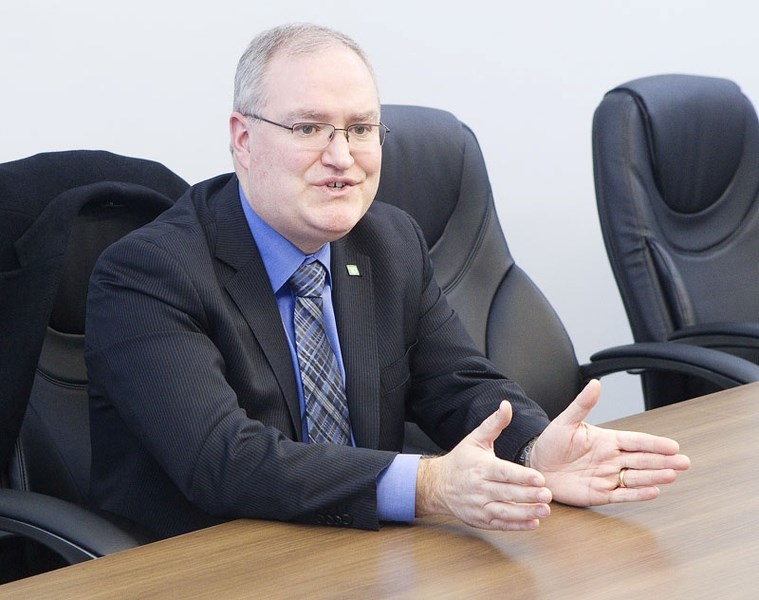Q: Does Alberta need to press harder to have more upgrading in the province, to make more markets available to us?
A: There is no question that Canada would benefit, and Alberta would benefit, if we did more of the upgrading here. And it doesn’t just have to be energy. Any increase in value added is good for economic growth.
The challenge is how to encourage businesses to change their behaviour. When you look at things such as refineries, you find that producers locate refineries for petroleum in South East Asia. That is where the demand is. So the market left on its own is probably not going to create the shift and it takes that additional government incentive to encourage businesses to do that.
That is one dimension, but we also desperately need increased pipeline capacity and that’s just about shipping the raw crude oil. If Alberta wants to develop its energy sector, it needs to increase pipeline capacity and get to a deep-water port.
Q: What are our options?
A: You can take it through the Keystone XL pipeline down to the Gulf of Mexico, you can go across the Rockies to the West Coast and you can ship it from a deep-water port in Eastern Canada.
If you ship crude oil from the East Coast to Asia it only costs $2 more a barrel than doing it from the West Coast. And that’s as long as you use one of the giant supertankers. St. John, New Brunswick, can accommodate them but Quebec City can only accept Suez-capacity tankers but not the larger ones.
Q: What are the economics to build a pipeline and what are the costs to get it to the coast?
A: The cheapest option is to get it to the West Coast. The next cheapest is to get it to Quebec to satiate Eastern demand even if you don’t export it. It’s cheaper to go from Alberta to Quebec than to the Gulf of Mexico because the pipeline infrastructure is already in place and you are just reversing the direction.
It also depends on what you expect to happen to the price of crude oil. One of the challenges we ran into is that the eastern option doesn’t look as attractive if Keystone XL is coming through. And if the market thinks that this is happening it affects the price of oil.
But we had a revolution and that is shale gas. If it is completely developed, it would provide for an awful lot of oil and natural gas. Ten years ago we said the American market consumed no matter how much we produced. Now, with shale gas, they may not actually need all of our energy. America is already natural gas independent. I don’t think it will become oil independent but it may not import as much.
Q: Would we benefit from replacing imported oil with our own? Can we afford to not get our energy supplies outside of Canada?
A: If we want to develop our energy sector we need to tap into other markets. A good starting point is to meet the domestic demand for energy and substitute domestic oil for imported oil. But ultimately we want to get our oil to other markets.
The world needs our energy if you think about economic development and how fast global growth is going to be. You still need to behave in an environmentally responsible way but at the end the day we need to develop our resources. It is going to create an awful lot of job and economic opportunities for Canadians.
Q: What are the consequences if we fail to get pipelines to the East Coast or the Gulf of Mexico?
A: Slower economic growth and weaker royalties, which means challenging government finances. It will affect job creation. And slower growth in the economy gives you weaker increases on your tax base and your taxes support your social programs. That’s coming at a time when an aging population is going to put more pressure on the health care system.
Q: Does this province need a sales tax?
A: We think the government’s deficit will come in at about 0.8 per cent to one per cent of the GDP. Alberta’s fiscal challenge is an awful lot less than in other provinces. But at the end of the day, responsible fiscal policy is to run balanced books. If your economy is going to grow at close to three per cent you don’t want a government running deficits.
The rule of thumb for austerity is seventy to eighty per cent spending cuts and twenty to thirty per cent increased tax revenues. Often having a sales tax isn’t about raising taxes but changing composition. You can put in a sales tax and cut personal income tax rates.
That improves competitiveness of the economy as opposed to just raising taxes. And then the deficit marginally eliminates itself through spending restraints, higher tax revenues and growth in the economy. To avoid hitting people with lower incomes harder you can do income transfers back to low-income households to compensate them for the increased sales tax.
Q: One day oil will run out and if we are used to living from its proceeds what will we do next?
A: Alberta has an aging population but it is also a very attractive place with a relative young population growth. At the same time it has a very innovative market. It supports productivity and innovation, which is a bigger challenge in some of the other provinces. Those two perspectives should make for good prospects in Alberta.




